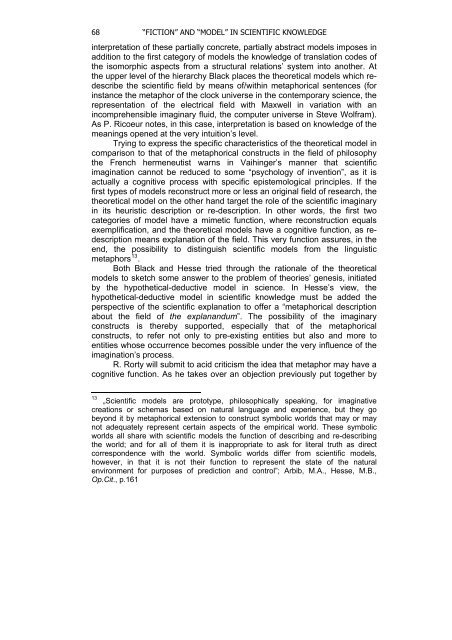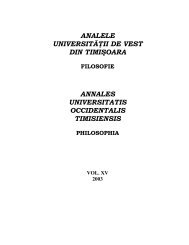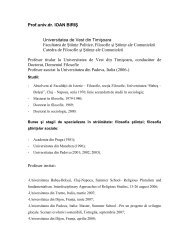VOL. IV (XXI) 2009 - Departamentul de Filosofie si Stiinte ale ...
VOL. IV (XXI) 2009 - Departamentul de Filosofie si Stiinte ale ...
VOL. IV (XXI) 2009 - Departamentul de Filosofie si Stiinte ale ...
You also want an ePaper? Increase the reach of your titles
YUMPU automatically turns print PDFs into web optimized ePapers that Google loves.
68 “FICTION” AND “MODEL” IN SCIENTIFIC KNOWLEDGE<br />
interpretation of these partially concrete, partially abstract mo<strong>de</strong>ls imposes in<br />
addition to the first category of mo<strong>de</strong>ls the knowledge of translation co<strong>de</strong>s of<br />
the isomorphic aspects from a structural relations’ system into another. At<br />
the upper level of the hierarchy Black places the theoretical mo<strong>de</strong>ls which re<strong>de</strong>scribe<br />
the scientific field by means of/within metaphorical sentences (for<br />
instance the metaphor of the clock universe in the contemporary science, the<br />
representation of the electrical field with Maxwell in variation with an<br />
incomprehen<strong>si</strong>ble imaginary fluid, the computer universe in Steve Wolfram).<br />
As P. Ricoeur notes, in this case, interpretation is based on knowledge of the<br />
meanings opened at the very intuition’s level.<br />
Trying to express the specific characteristics of the theoretical mo<strong>de</strong>l in<br />
comparison to that of the metaphorical constructs in the field of philosophy<br />
the French hermeneutist warns in Vaihinger’s manner that scientific<br />
imagination cannot be reduced to some “psychology of invention”, as it is<br />
actually a cognitive process with specific epistemological principles. If the<br />
first types of mo<strong>de</strong>ls reconstruct more or less an original field of research, the<br />
theoretical mo<strong>de</strong>l on the other hand target the role of the scientific imaginary<br />
in its heuristic <strong>de</strong>scription or re-<strong>de</strong>scription. In other words, the first two<br />
categories of mo<strong>de</strong>l have a mimetic function, where reconstruction equals<br />
exemplification, and the theoretical mo<strong>de</strong>ls have a cognitive function, as re<strong>de</strong>scription<br />
means explanation of the field. This very function assures, in the<br />
end, the pos<strong>si</strong>bility to distinguish scientific mo<strong>de</strong>ls from the linguistic<br />
metaphors 13 .<br />
Both Black and Hesse tried through the ration<strong>ale</strong> of the theoretical<br />
mo<strong>de</strong>ls to sketch some answer to the problem of theories’ gene<strong>si</strong>s, initiated<br />
by the hypothetical-<strong>de</strong>ductive mo<strong>de</strong>l in science. In Hesse’s view, the<br />
hypothetical-<strong>de</strong>ductive mo<strong>de</strong>l in scientific knowledge must be ad<strong>de</strong>d the<br />
perspective of the scientific explanation to offer a “metaphorical <strong>de</strong>scription<br />
about the field of the explanandum”. The pos<strong>si</strong>bility of the imaginary<br />
constructs is thereby supported, especially that of the metaphorical<br />
constructs, to refer not only to pre-existing entities but also and more to<br />
entities whose occurrence becomes pos<strong>si</strong>ble un<strong>de</strong>r the very influence of the<br />
imagination’s process.<br />
R. Rorty will submit to acid criticism the i<strong>de</strong>a that metaphor may have a<br />
cognitive function. As he takes over an objection previously put together by<br />
13 „Scientific mo<strong>de</strong>ls are prototype, philosophically speaking, for imaginative<br />
creations or schemas based on natural language and experience, but they go<br />
beyond it by metaphorical exten<strong>si</strong>on to construct symbolic worlds that may or may<br />
not a<strong>de</strong>quately represent certain aspects of the empirical world. These symbolic<br />
worlds all share with scientific mo<strong>de</strong>ls the function of <strong>de</strong>scribing and re-<strong>de</strong>scribing<br />
the world; and for all of them it is inappropriate to ask for literal truth as direct<br />
correspon<strong>de</strong>nce with the world. Symbolic worlds differ from scientific mo<strong>de</strong>ls,<br />
however, in that it is not their function to represent the state of the natural<br />
environment for purposes of prediction and control”; Arbib, M.A., Hesse, M.B.,<br />
Op.Cit., p.161




